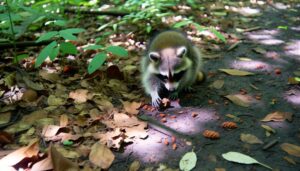How Can Raccoons Eat Dog Food Without Harm?
Raccoons can consume dog food due to their omnivorous diet and opportunistic foraging behaviors. However, feeding raccoons dog food can result in nutritional imbalances and gastrointestinal distress.
This artificial diet can disrupt their natural foraging habits, leading to increased human-wildlife interactions and potential ecological consequences. Consequently, raccoons may develop dependence on easy food sources and diminish their instinctual activities.
Implementing measures such as raccoon-proof food storage and alternative feeding options like fruits and nuts can mitigate these risks. To further understand these impacts and effective preventive strategies, additional insights are essential.

Key Takeaways
- Feeding raccoons dog food can lead to significant health risks due to nutritional imbalances.
- Dog food consumption can cause gastrointestinal distress and malnutrition in raccoons.
- Raccoons' natural foraging behaviors may be disrupted by reliance on dog food.
- Increased raccoon interactions with humans and other raccoons can heighten disease transmission risks.
- A varied diet of fruits, nuts, lean meats, and insects is more suitable for raccoons.
Raccoon Diet Basics
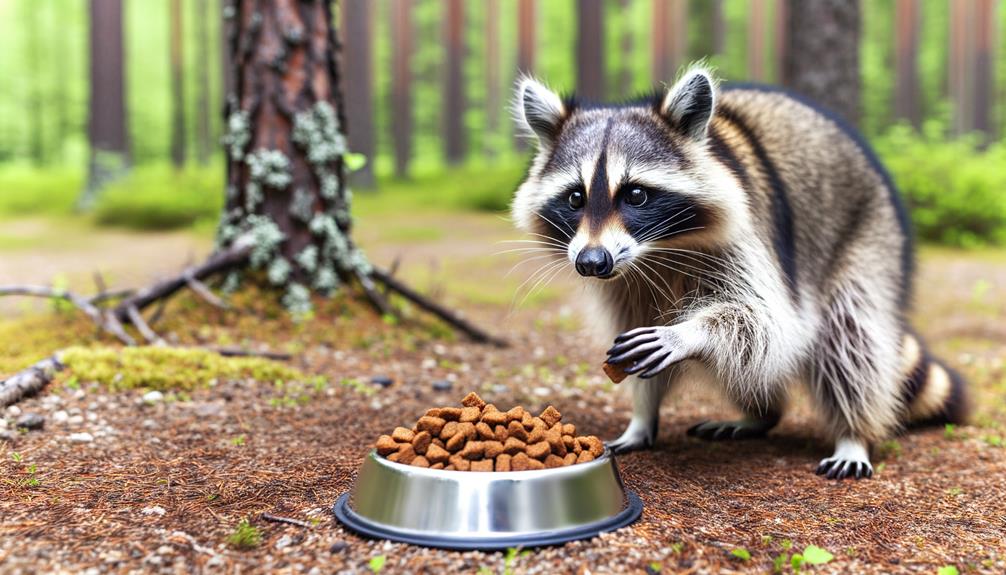
Raccoons (Procyon lotor) are omnivorous mammals that exhibit dietary flexibility, consuming a diverse array of food sources depending on availability and seasonality. Their diet typically includes fruits, nuts, insects, small vertebrates, and aquatic organisms such as crayfish.
Seasonal variations influence their dietary preferences; for example, during autumn, raccoons often consume more high-energy foods to accumulate fat reserves for winter. Additionally, their foraging behavior demonstrates opportunistic feeding, allowing them to exploit anthropogenic food sources such as garbage and pet food.
This adaptive dietary strategy is vital for their survival in various habitats, from urban to rural environments. Understanding raccoon dietary habits is important for managing human-wildlife interactions and mitigating potential conflicts, such as those arising from raccoons accessing pet food.
Nutritional Content of Dog Food
Dog food is formulated to provide vital nutrients such as proteins, fats, carbohydrates, vitamins, and minerals tailored to canine physiology.
However, raccoons have unique dietary requirements, necessitating a comparison of these nutritional profiles to determine suitability.
Understanding the alignment or disparity between these needs is important for evaluating the implications of raccoons consuming dog food.
Key Nutrients in Dog Food
Commercial canine nutrition formulations are designed to provide a balanced array of macronutrients, including proteins, fats, and carbohydrates, as well as essential micronutrients such as vitamins and minerals.
Proteins, derived primarily from meat sources, are vital for muscle maintenance and repair. Fats, including essential fatty acids, play a role in energy provision and cellular health. Carbohydrates, often sourced from grains or vegetables, aid in digestive function and energy metabolism.
Additionally, these formulations are fortified with vitamins such as A, D, E, and B-complex, which support immune function, skin health, and metabolic processes. Minerals like calcium, phosphorus, and zinc are crucial for skeletal health and enzymatic reactions. This nutrient composition ensures that dogs receive thorough dietary support for overall well-being.
Raccoon Dietary Needs
Understanding the nutritional requirements of raccoons is crucial in assessing whether dog food can adequately meet their dietary needs. Raccoons are omnivorous, requiring a balanced intake of proteins, fats, carbohydrates, vitamins, and minerals. Their diet in the wild typically includes fruits, nuts, insects, small mammals, and aquatic organisms.
Dog food is mainly formulated for canine physiology, often rich in proteins and fats but may lack the variety of nutrients raccoons naturally consume. While dog food can provide temporary sustenance, it may result in nutritional imbalances if relied upon long-term. Evidence-based studies highlight the importance of dietary diversity for raccoons to prevent deficiencies in essential micronutrients.
Hence, dog food should not be considered a sole dietary source for raccoons.
Health Risks for Raccoons
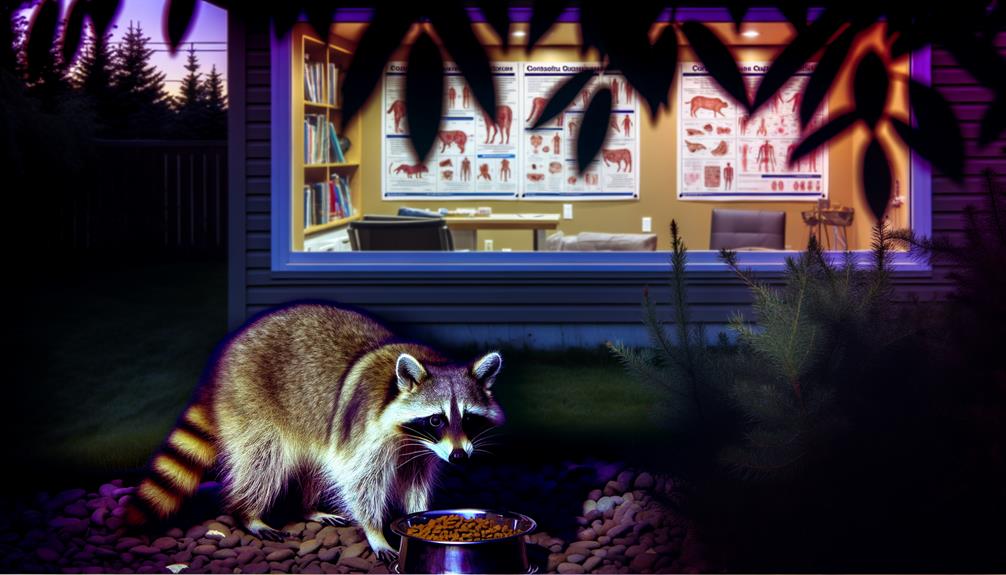
Feeding raccoons dog food can result in significant health risks due to nutritional imbalances, as the dietary requirements of raccoons differ markedly from those of dogs. This nutritional disparity can lead to malnutrition and subsequent systemic health issues.
Additionally, raccoons may experience gastrointestinal distress, including diarrhea and vomiting, as their digestive systems are not adapted to process certain ingredients commonly found in dog food.
Nutritional Imbalance Concerns
Nutritional imbalances from consuming dog food can lead to significant health risks for raccoons, including deficiencies in essential vitamins and minerals. Dog food is formulated to meet the dietary needs of canines, which differ markedly from those of raccoons.
For instance, raccoons require a higher intake of taurine, an amino acid essential for their cardiovascular and ocular health. Also, the calcium-to-phosphorus ratio in dog food is not tailored for raccoons, potentially leading to skeletal deformities and compromised bone health.
Moreover, the fat and protein content in dog food may not align with the metabolic requirements of raccoons, predisposing them to obesity and hepatic lipidosis. These nutritional disparities underscore the importance of species-specific diets to maintain the health in raccoons.
Potential Digestive Issues
In addition to nutritional imbalances, raccoons consuming dog food may face significant digestive issues due to their differing gastrointestinal physiology. Raccoons possess a shorter digestive tract compared to canines, which limits their ability to efficiently process certain ingredients commonly found in dog food, such as high levels of grains and proteins.
This can lead to gastrointestinal disturbances, including diarrhea, bloating, and malabsorption syndromes. Additionally, preservatives and additives in commercial dog food may induce hypersensitivity reactions in raccoons, further complicating their digestive health.
Chronic ingestion of inappropriate food can compromise the integrity of their gut lining, potentially resulting in long-term health consequences. Hence, it is important to provide raccoons with a diet that aligns more closely with their natural nutritional requirements.
Behavioral Impacts
Consumption of dog food by raccoons can lead to significant alterations in their natural foraging behaviors and social dynamics. Reliance on easily accessible dog food may reduce their engagement in instinctual foraging activities, potentially disrupting their ecological role. This dietary shift can also lead to increased interactions among raccoons and between raccoons and humans, heightening the risk of disease transmission.
| Behavioral Aspect | Impact of Dog Food Consumption |
|---|---|
| Foraging Behavior | Decreased natural foraging |
| Social Interactions | Elevated intra-species interactions |
| Human-Raccoon Encounters | Increased frequency |
| Ecological Role | Potential disruption |
| Disease Transmission Risk | Heightened due to higher interaction rates |
Such behavioral changes necessitate a deeper understanding of the broader ecological implications.
Preventing Access to Dog Food
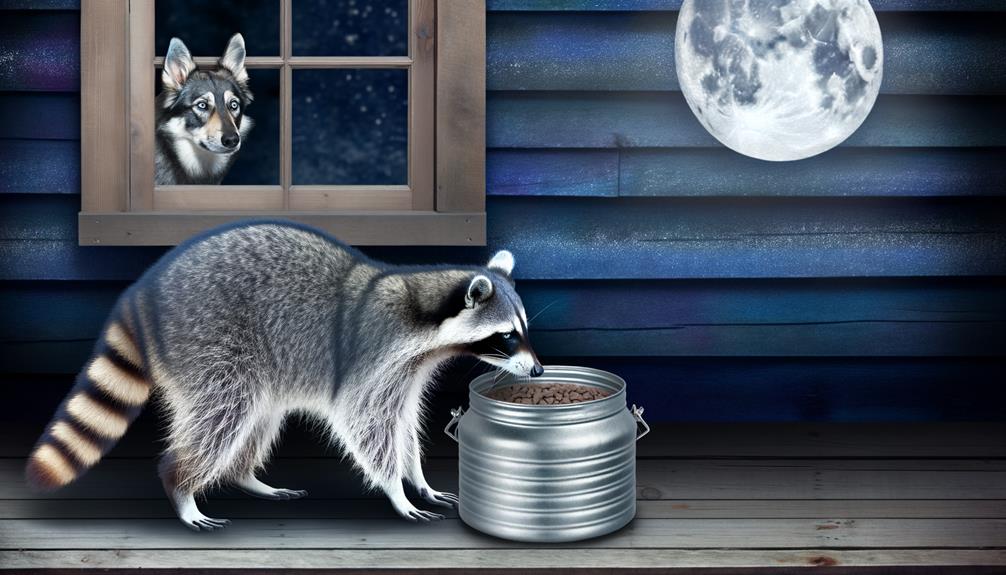
Implementing effective strategies to prevent raccoons from accessing dog food is crucial for mitigating the associated ecological and health risks. Securing food containers with raccoon-proof lids and storing them indoors reduces accessibility to a great extent.
Elevated feeding stations, designed specifically for dogs, can also deter raccoon intrusion. Regularly scheduled feeding times, rather than leaving food out continuously, minimize prolonged exposure.
Additionally, installing motion-activated lights or deterrent devices around feeding areas can discourage nocturnal foraging behaviors. Utilizing these evidence-based interventions not only protects the nutritional source intended for pets but also limits the unintended encouragement of raccoon presence in residential areas.
Employing a multifaceted approach ensures a balanced ecosystem and promotes overall pet and wildlife health.
Alternative Food Options
Exploring nutritionally adequate and species-appropriate alternative food options for raccoons can mitigate their reliance on dog food while ensuring their dietary needs are met. Raccoons are omnivorous, requiring a balanced diet that includes proteins, fats, carbohydrates, vitamins, and minerals.
Suitable alternatives include fruits (e.g., berries, apples), vegetables (e.g., corn, peas), nuts, and lean meats. Insect protein, such as mealworms, also aligns with their natural foraging behavior. Commercially available raccoon-specific feeds can offer a formulated option that meets their nutritional requirements.
Ensuring a variety of food sources can prevent nutritional deficiencies and promote overall health. It is essential to avoid processed human foods, which can lead to obesity and other health issues in raccoons.
Observing Raccoon Behavior
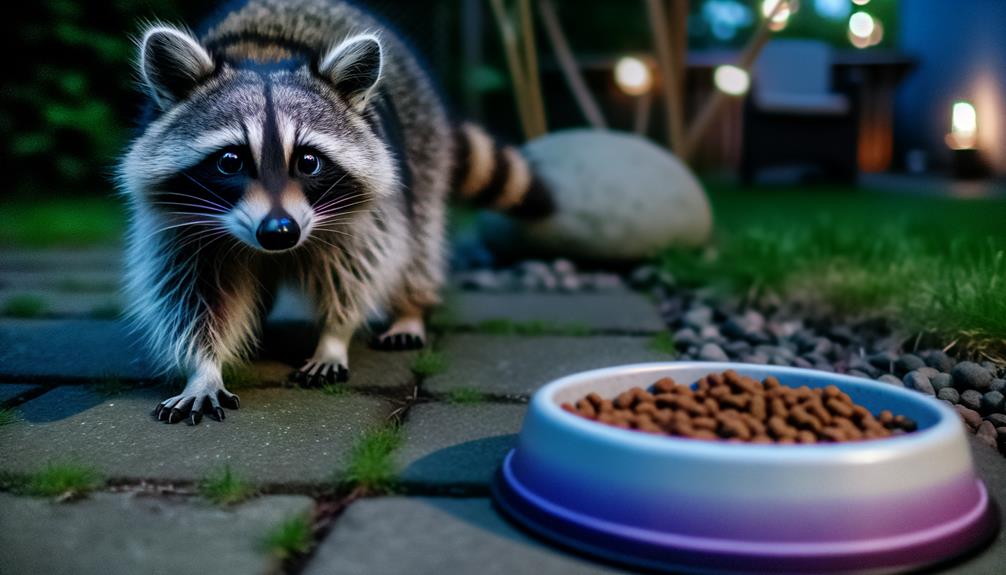
Understanding raccoon behavior is crucial for ensuring that alternative food options are both accessible and appealing to these omnivorous creatures. Raccoons (Procyon lotor) display nocturnal activity patterns, foraging primarily during twilight hours. They possess nimble forepaws capable of manipulating objects and opening containers, a trait that enables them to access various food sources.
Observational studies have documented their opportunistic feeding habits, which include consuming fruits, insects, small mammals, and human refuse. Evidence suggests that raccoons exhibit both solitary and social foraging behaviors, influenced by resource availability and environmental conditions.
Conclusion
The consumption of dog food by raccoons symbolizes an encroachment upon human territory, representing a disruption in their natural dietary patterns.
This practice poses substantial health risks, including nutritional imbalances and increased susceptibility to disease. Moreover, it fosters problematic behavioral adaptations, leading to dependency and potential human-wildlife conflicts.
Preventative measures and alternative food provisions are imperative to mitigate these adverse effects. Vigilant observation of raccoon behavior can additionally inform strategies to preserve their ecological integrity.



